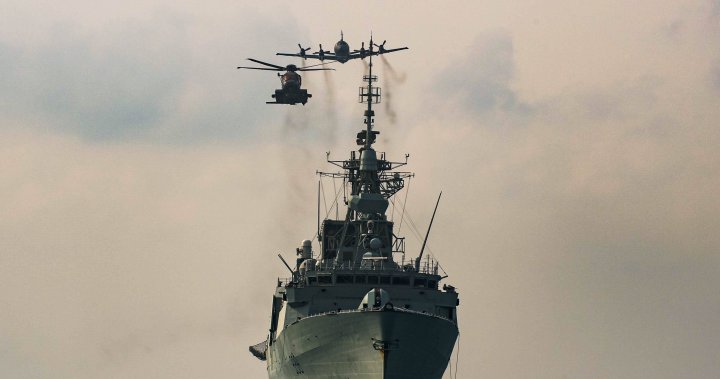Canada alarmed as Chinese fighter pilots ‘buzz’ Canadian planes over international waters – National | Globalnews.ca
Senior Canadian government officials are growing increasingly concerned over a dangerous escalation in aggression by Chinese fighter pilots in the skies above the Asia-Pacific region.
Multiple sources in the Canadian Forces and the federal government tell Global News that Chinese jets are repeatedly “buzzing” Canadian intelligence planes that are part of a United Nations mission over international waters.
Those jets are frequently flying as close as 20 to 100 feet from the Canadian planes, sources say — so close that Canadian pilots can make eye contact with the Chinese pilots, and sometimes see them raising their middle fingers. The sources spoke on condition of anonymity to discuss sensitive information.
“(That distance is) scary close at those high speeds, and it could lead to disaster in a crash,” said Charles Burton, a senior fellow at the Macdonald-Laurier Institute in Ottawa.
“You do it too much, and eventually, sometime, it’s going to go wrong.”
Read more:
As China pressed over Russia stance, Canada’s MPs revive special committee on ties
The Canadian CP-140 Aurora planes are currently taking part in Operation Neon, part of UN efforts to prevent North Korea’s development of weapons of mass destruction.
Sources tell Global News there have been approximately 60 of these types of intercepts with Chinese fighter jets since Christmas, over two dozen of which have been deemed dangerous.
The Canadian government has sent multiple diplomatic reprimands to Beijing about the incidents, according to the sources, calling the Chinese pilots’ conduct “unsafe and unprofessional.” China is not believed to have responded to those reprimands, which have not stopped the incidents from continuing.

Burton says he’s worried about not only a potential mid-air collision as a result of the Chinese pilots’ behaviour, but also the risk of an international incident between Canada and China.
“I’m completely puzzled as to why China would take the risk of fomenting an international incident that could lead to extremely heightened tensions if the Chinese aircraft leads to loss of Canadian life,” he said.
“And the fact the Chinese government is not responding to Canadian concerns, (not) seeking to reign in this kind of adventurism, is also very concerning.”
Tensions between Canada and China have yet to recover from the nearly three-year-long detention of Huawei CFO Meng Wanzhou by Canada on U.S. fraud charges, and the subsequent imprisonment of Canadians Michael Kovrig and Michael Spavor in China. All three were released last September after Meng struck a deal with U.S. prosecutors.
Last month, Canada banned Huawei and fellow Chinese telecom giant ZTE from contributing equipment to its growing 5G network, further angering Beijing.
Read more:
Huawei ban, delay unrelated to China seizing the two Michaels, minister says
Billie Flynn, a retired squadron commander for the Royal Canadian Air Force and former F-35 fighter jet test pilot, says the Aurora the Canadians are flying — which he called “a big, lumbering plane” — would have difficulty manoeuvring away from a fighter jet flying so close.
“It’d be terrifying for (the Aurora pilot) to do any kind of evasive manoeuvre, because they might trip the Chinese fighter pilot into doing something even more irresponsible and more dangerous,” he told Global News.
“The best they can do is fly along and hope the Chinese fighter pilot disappears.”
Flynn added that the turbulence created by the fighter jet would put the Aurora pilot at even greater risk of losing control.
All of those factors would put the Aurora at the “mercy” of the skill of a nearby fighter jet pilot, he says.
“Being that aggressive, that much ‘hotdogging,’ suggests that (the Chinese pilots are) probably not that seasoned, not that good, which puts the Aurora crews at even more risk,” he said.

One source told Global News that before each mission, pilots and their commanders discuss potential risks and whether to proceed with a flight. The concern now, the source said, is that the “buzzing” tactic by Chinese fighter jet pilots is here to stay, raising the risk level for future flights.
China has increased its military presence in the Asia-Pacific region over the last two years, particularly around Taiwan, which Beijing claims as its own territory. It has stepped up drills and manoeuvres around the island, and confirmed on Wednesday that it has conducted a combat “readiness patrol” in the sea and air in recent days.
The Chinese government has also continued to support North Korea economically and financially despite a renewed spate of rocket launches this year, including intercontinental ballistic missiles, which has drawn condemnation from its Asian neighbours and the West.
Last month, China and Russia vetoed new sanctions backed by the U.S. at the UN Security Council in response to North Korea’s weapons tests.
—With files from Marc-André Cossette
© 2022 Global News, a division of Corus Entertainment Inc.
For all the latest world News Click Here




